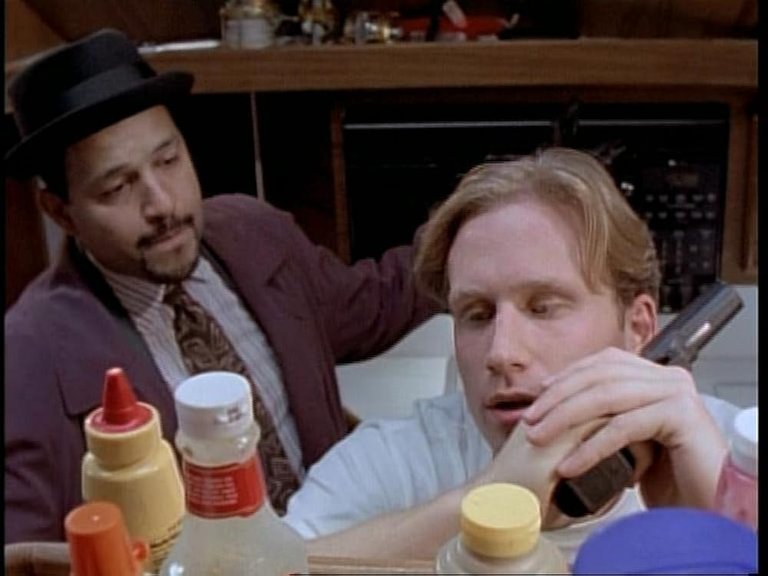
Have a Conscience (S05E13)
Airdate: 17 January 1997
Written by: James Yoshimura
Directed by: Uli Edel
Running Time: 46 minutes
In the twilight seasons of Homicide: Life on the Street, the series’ writers developed a ruthless fascination with dismantling its central figures, often stripping them of dignity or purpose. This approach yielded mixed results. Characters like Bayliss suffered from haphazard, unconvincing arcs that reduced him to a caricature of indecision, his moral complexity flattened into mere inconsistency. By contrast, Detective Mike Kellerman’s unravelling—particularly in episodes like Have a Conscience—emerged as a masterclass in how to deconstruct a character without sacrificing narrative coherence or emotional authenticity. The episode stands as a bleak yet compelling examination of a man corroded by systemic failure and his own demons, proving that even in its uneven later years, Homicide retained flashes of brilliance.
The narrative opens on what should be Kellerman’s redemption. After surviving a federal grand jury investigation into the Arson Unit scandal—a feat requiring him to thread the needle between honesty and loyalty to corrupt colleagues—he emerges legally unscathed. Yet vindication rings hollow. The media, which had voraciously covered his fall from grace, now ignores his exoneration, denying him the public absolution he craves. This hypocrisy gnaws at him, culminating in a spiteful confrontation with prosecutor Gail Ingram, the very person responsible for his legal salvation. Kellerman’s ingratitude is not merely petulant; it reflects a deeper disillusionment with a justice system that weaponises scandal but shrugs at resolution. His fury is a man realising that truth rarely triumphs—it merely survives, battered and ignored.
His bitterness metastasises under the prodding of Captain Gaffney, whose sardonic remarks underscore his alienation. The final catalyst arrives with the murder of an elderly Korean shopkeeper, a crime initially dismissed as routine until Kellerman uncovers its ties to Luther Mahoney. The victim, it emerges, had defiantly resisted street dealers belonging to Mahoney’s drug empire—a stand that cost him his life. For Kellerman, this case becomes a grotesque mirror of his own futility: here lies a man who did the “right thing” and paid the ultimate price, while Mahoney, untouchable as ever, mocks the idea of accountability. The injustice ignites a spiral of rage and despair, exacerbated by financial problem and the gnawing guilt of past compromises. When Lewis discovers Kellerman on his boat, teetering on the edge of suicide, the scene crackles with raw desperation. Lewis, still haunted by the suicide of his former partner Crosetti, refuses to lose another to the same darkness. His determination to save Kellerman—even at the risk of his own safety—transcends mere partnership; it becomes a visceral act of atonement, a vow to rewrite a familiar tragedy.
Sceptics might dismiss the episode’s intensity as overwrought, but such criticism overlooks the deft hand of writer James Yoshimura, a stalwart of Homicide’s golden era. Yoshimura avoids cheap theatrics by anchoring Kellerman’s breakdown in psychological plausibility. The detective’s descent is not a sudden rupture but the culmination of years spent navigating moral quicksand—a slow bleed of hope. His outbursts, though visceral, never feel unearned; they are the logical endpoint of a man trapped between institutional rot and personal failing. The script’s power lies in its refusal to romanticise his pain. Kellerman is neither martyr nor antihero—he is simply broken, a casualty of a world where integrity is both weaponised and discarded.
German director Uli Edel, whose filmography oscillates between brilliance and mediocrity, delivers one of his most focused efforts here. The episode’s deliberate pacing initially risks tedium, with Kellerman’s early tirades bordering on repetitive. Yet this measured rhythm serves a purpose, lulling the viewer into a false sense of predictability before plunging them into the abyss of his psyche. Reed Diamond’s performance is a revelation, his portrayal of Kellerman’s fraying resolve oscillating between volcanic rage and hollow detachment. A lesser actor might have leaned into melodrama, but Diamond conveys collapse through subtlety. Clark Johnson’s Lewis provides the perfect counterweight. Their dynamic, forged in shared trauma, elevates the climactic confrontation into something transcendent. Edel’s decision to intercut this tension with scenes of their oblivious colleagues carousing at the Waterfront Bar is inspired. The juxtaposition—jovial laughter against life-and-death stakes—underscores the isolating nature of their work, a reminder that salvation, when it comes, is often a solitary pursuit.
For all its strengths, Have a Conscience is marred by a superfluous subplot involving Pembleton’s attempts to salvage his partnership with Bayliss. These scenes, riddled with stilted dialogue and half-baked conflict, feel like contractual obligations rather than organic storytelling. Bayliss, already diminished by erratic writing, becomes a narrative deadweight here, his indecision over the partnership lacking the nuance that once defined him. The subplot’s inclusion dilutes the episode’s intensity, forcing viewers to pivot from Kellerman’s visceral crisis to a tedious bureaucratic squabble. A tighter edit—excising these distractions entirely—would have sharpened the focus on Kellerman’s journey, transforming a very good episode into a flawless one.
Have a Conscience exemplifies Homicide at its most incisive and self-destructive. It is a harrowing portrait of a man undone by the very systems he swore to uphold, elevated by stellar performances and unflinching writing. Yet its flaws—namely, the Bayliss-Pembleton detour—serve as a reminder of the series’ late-era struggles to balance ensemble storytelling with singular character studies. When the episode trusts its audience to sit with Kellerman’s anguish, it achieves a rare, almost unbearable intimacy. When it defaults to formula, it stumbles. But in its finest moments, this is television that refuses to look away—a mirror held to the cost of clinging to principle in a world that rewards compromise.
RATING: 7/10 (+++)
Blog in Croatian https://draxblog.com
Blog in English https://draxreview.wordpress.com/
InLeo blog https://inleo.io/@drax.leo
Hiveonboard: https://hiveonboard.com?ref=drax
Rising Star game: https://www.risingstargame.com?referrer=drax
1Inch: https://1inch.exchange/#/r/0x83823d8CCB74F828148258BB4457642124b1328e
BTC donations: 1EWxiMiP6iiG9rger3NuUSd6HByaxQWafG
ETH donations: 0xB305F144323b99e6f8b1d66f5D7DE78B498C32A7
BCH donations: qpvxw0jax79lhmvlgcldkzpqanf03r9cjv8y6gtmk9